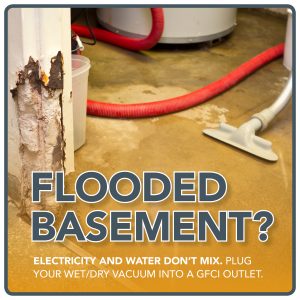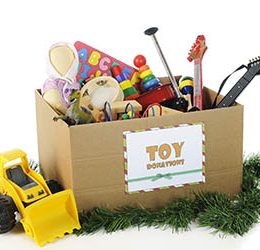 One of the most basic electrical safety rules is “electricity and water don’t mix.” It’s especially important to keep that in mind if your home has been impacted by flooding.
One of the most basic electrical safety rules is “electricity and water don’t mix.” It’s especially important to keep that in mind if your home has been impacted by flooding.
“Though it’s normal to want to get things cleaned up as soon as possible, don’t rush into the flooded area without following some basic electric safety rules,” said Chris Wesner, line foreman at Orange County REMC. “If water has come into contact with your electrical systems and you come in contact with the water, you face a risk of electrical shock.”
So, Wesner warns, if your basement is — or was — flooded, and the water rose above the electrical outlets, baseboard heaters or furnace, or is near your electrical panel, do not go down in the basement. Not only can electricity travel through water, it can shock you through a wet floor. Call your electric co-op to disconnect power to your home — and make sure Orange County REMC employees have done so before you head to the basement.
When you do head to the basement, don’t go alone. You never know when you’ll need help. Put on chest waders and clip a flashlight to your waders or hat. Flooded areas can be dark and slippery.
If flooding is widespread throughout your neighborhood or town, watch out for downed powerlines. Call 911 and Orange County REMC if you see them and remember to stay in your vehicle if you come in contact with them.
In instances where flooding is imminent and you have time to evacuate before floodwaters enter your home, you may be able to take a few precautions before you head to a safe location.
“One thing you can easily do is disconnect power to your home. Simply turn the main switch by your electrical panel off,” Wesner said. “Depending on how much time you have, you can pack up your electrical appliances and devices or move them to an upper level of your home — above where you think flood waters will rise.”
Be sure to hire a licensed electrical contractor to check out your home’s electrical system after a flood to ensure it is safe for your electric cooperative to restore power to your home. Necessary repairs must be made before your home receives electric service again.
SOURCES: Electrical Safety Authority, Popular Mechanics
Dos and don’ts of cleaning up after the flood
- DO keep a flashlight and batteries on hand in case you have to maneuver flood waters in the dark.
- Electricity and water DON’T mix. That’s why you should make sure your wet/dry vacuum is plugged into a GFCI outlet.
- DO look for power strips that have GFCIs to use during cleanup.
- DON’T allow power cord connections to become wet.
- DO replace all circuit breakers and fuses that have been submerged in water.
- DON’T touch a circuit breaker or replace a fuse if your hands are wet or if you are standing on a wet surface. When resetting breakers, use a dry plastic- or rubber-insulated tool. Use only one hand.
Sources: FEMA, Electrical Safety Authority



